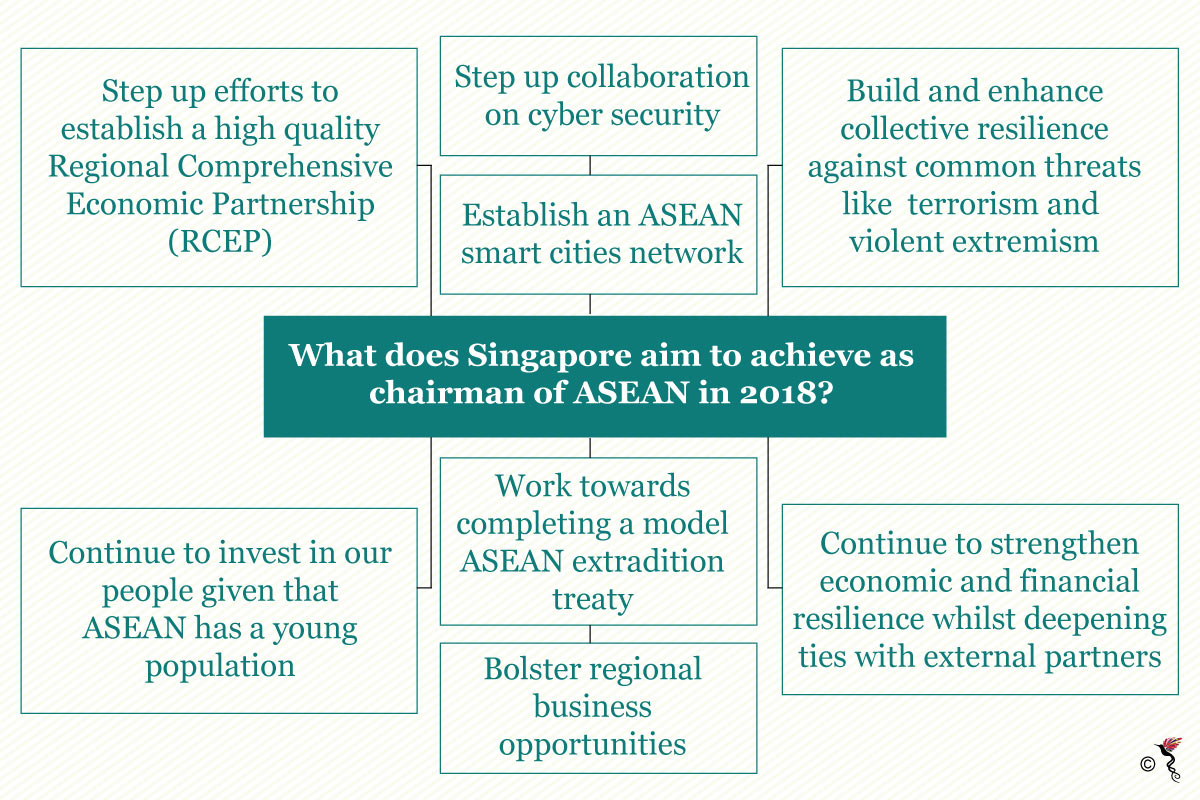“These are interesting times to be alive,” Singaporean Foreign Minister, Vivien Balakrishnan told a room full of journalists, former ambassadors, diplomats and academics at the ISEAS – Yusuf Ishak Institute on Tuesday.
That was the precursor to his lecture entitled “ASEAN: Next 50” on charting the next 50 years for the association as it celebrates its golden jubilee this year. Balakrishnan’s words resounded within the echo chambers of Southeast Asian regionalism even more now, since Singapore will be assuming the ASEAN mantle of leadership in 2018.
He began by first presenting the reality of the current global outlook – America’s waning influence, the rise of populism and extremism, and the pushback against free trade which has caused a certain degree of “middle-class anxiety.” However, he purports that the anxiety felt by many is due to the digital revolution that is just starting to sweep the globe.
Singapore’s 2018 ASEAN Chairmanship
He then laid out the priorities that the island nation would prioritise during its chairmanship under the theme, “Resilience and Innovation.”
“Singapore as the incoming chair of ASEAN, wants to focus on strengthening ASEAN’s resilience, and expanding our innovative capacity,” he announced.
Balakrishan listed a few of the island nation’s key priorities of its regional leadership to give a little flavour of what to expect in the upcoming year, including aspirations to develop an ASEAN smart cities network, stepping up cooperation on cybersecurity threats and bolstering business opportunities for small and medium enterprises (SME).

Expectations from Singapore's 2018 chairmanship of ASEAN.
Throughout his speech, the 56-year-old stressed on the importance of maintaining peace in the region and bolstering economic interdependence which is vital for the survival of ASEAN.
We believe that the way to secure peace is to promote interdependence and tell everyone that you gain more by working together, investing in one another, trading with each other," he said."
Balakrishnan also shared that when meeting with foreign dignitaries from countries like the US, China and Russia, he often stressed that it is in their long-term interests for the organisation to achieve success because “we will be your biggest trading partner.”
On the topic of trade liberalisation, he placed immense faith in the interdependency of economies – that it is better to be economically intertwined so that both sides benefit, instead of taking sides resulting in a zero-sum situation where only one side gains.
Balakrishnan expressed his aspirations for a free and open Asia Pacific free trade area, regardless of whether it is achieved via the newly rebranded, Comprehensive and Progressive Trans-Pacific Partnership (CPTPP) or the Regional Comprehensive Economic Partnership (RCEP).
“To us they are just multiple roads that lead to a larger destination,” he said.
Safeguarding ASEAN
When touching upon issues of grave geopolitical implications like the tensions in the Korean Peninsula and South China Sea dispute, Balakrishnan was quick to remind the audience to fall back on the notion of building trust amongst the key players in the geostrategic game.
He offered a sobering reminder that ASEAN is still subject to external forces, but it is extremely important for the organisation to continue to build mutual trust and not let any issues that may arise, bedevil the region’s agenda.
“The challenge is whether we allow these external tsunamis to overwhelm us, to divide us, or whether we collectively build a bigger, stronger ship that will allow us to navigate out of danger and to expand opportunities for all our people,” he said.
On the prevailing maritime dispute in the South China Sea, he noted that discussions on the Code of Conduct between ASEAN and China will be negotiated after it was formally announced during the ASEAN Summit in November.
“This is a very positive sign that both China and ASEAN countries want to achieve peace and stability and ensure that the South China remains a calm sea,” he told the audience.
He also stressed on the key aspects of unity and centrality as the guiding principle for the association. According to the seasoned diplomat, it is these traits that make ASEAN matter – even turning the heads of powerful leaders from both the Eastern and Western hemispheres of the world. But the challenge is often internal as ASEAN member states have to often balance between their long term national interests and regional ones.
Recommended stories: